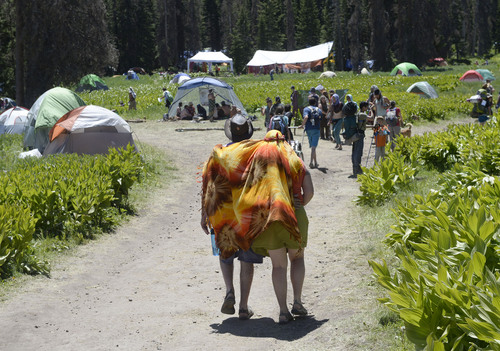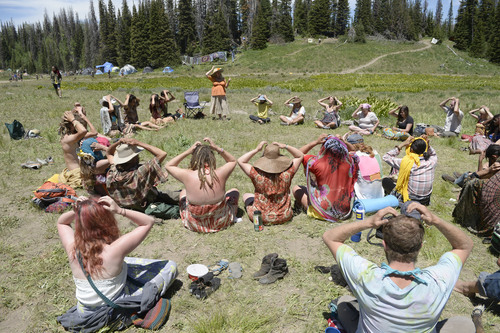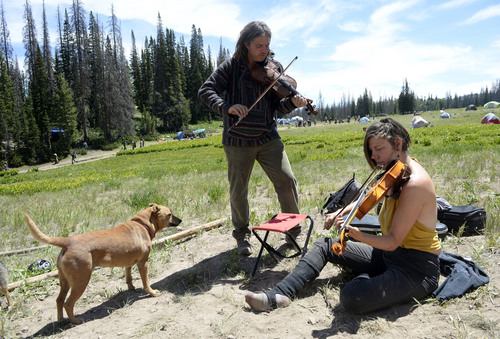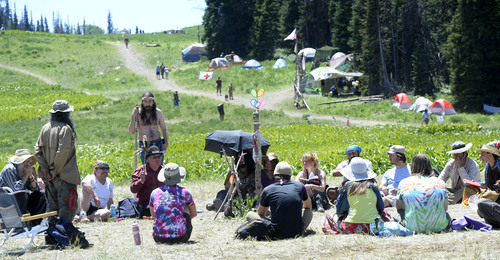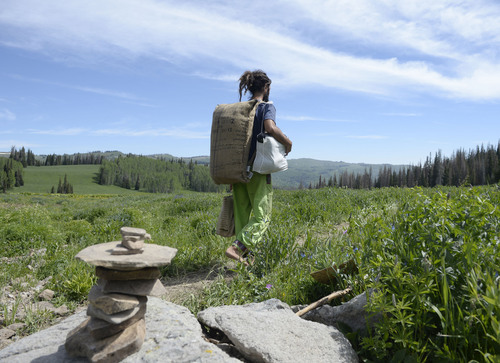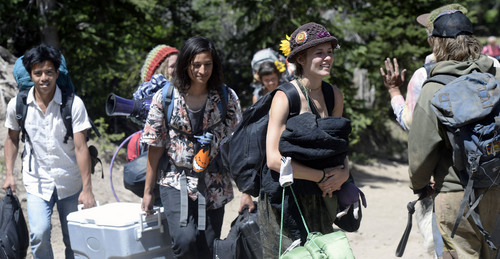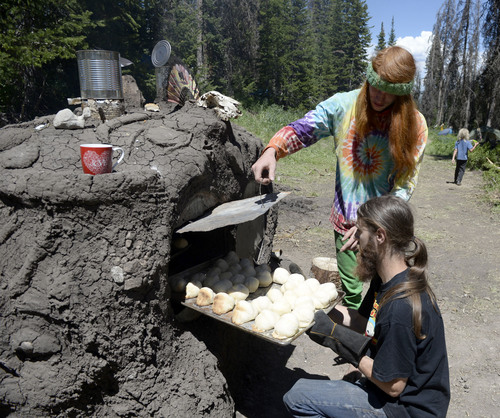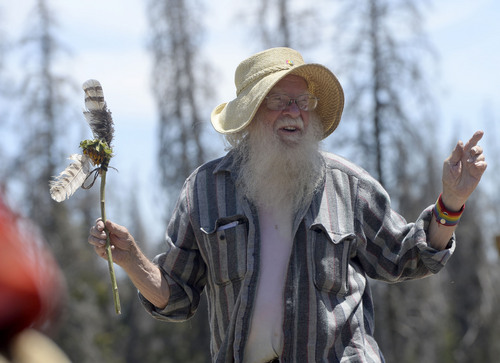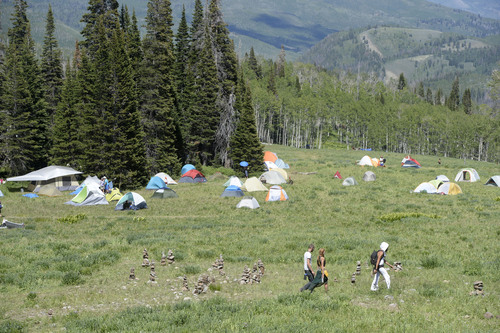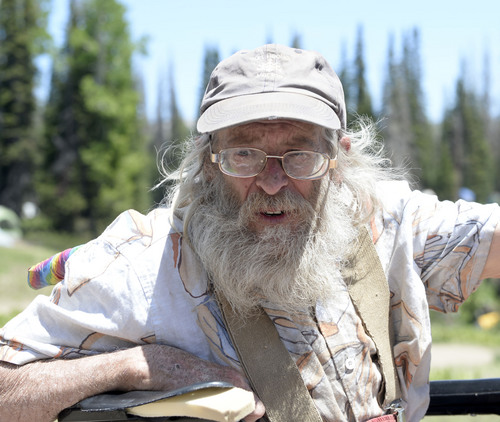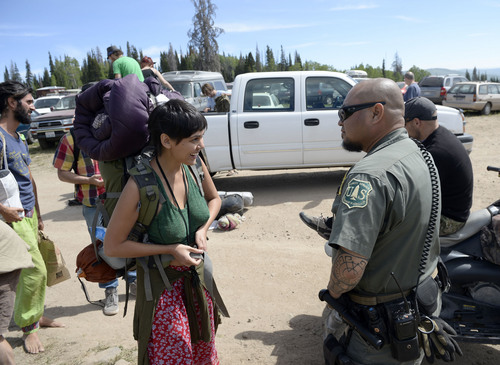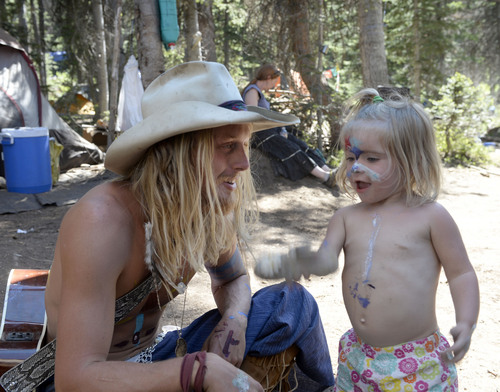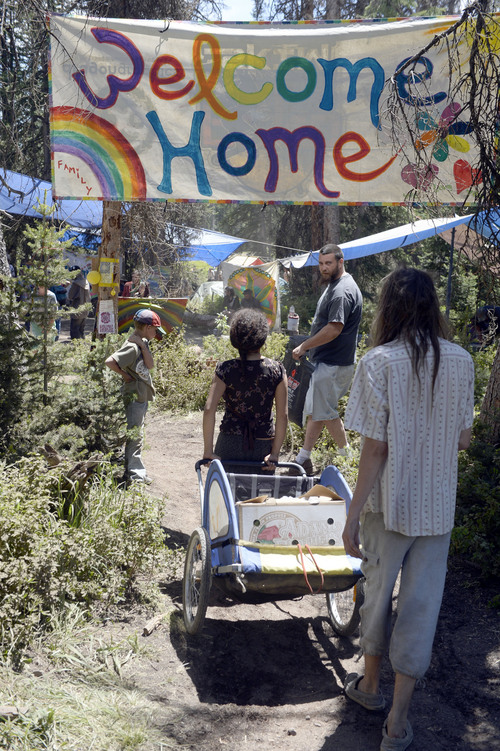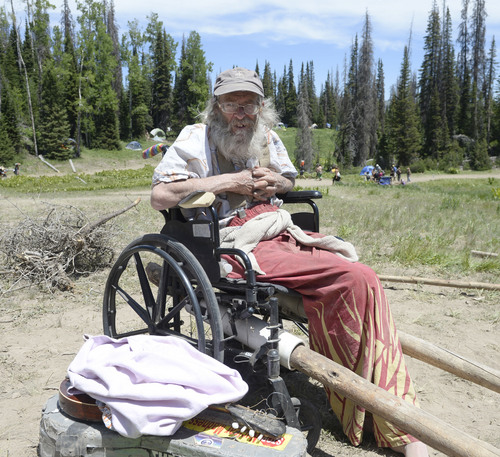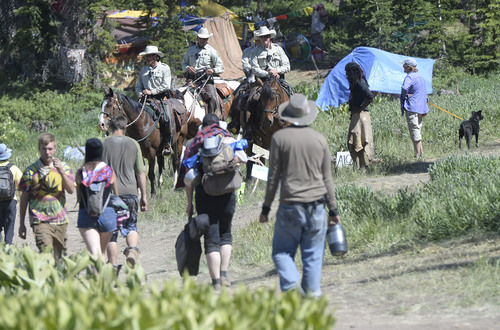This is an archived article that was published on sltrib.com in 2014, and information in the article may be outdated. It is provided only for personal research purposes and may not be reprinted.
West Fork of the Duchesne River • Robert Calvin Gordon III, seated comfortably in his wheelchair and clutching an old wooden mandolin, is describing the plot of his first, only and still-to-be-published novel. The title is Gone with the Whales.
"It's a cross between Gone with the Wind and Moby Dick, but with Rainbow sensibilities," Gordon says as he puffs on a foot-long marijuana joint.
Gordon's 68-year-old face, much of it hidden beneath a long white beard and oval glasses, is fixed with a grin. A wine-red skirt covers his feeble legs. In 1980, when Gordon was 34, he came to his first Rainbow Family Gathering. He's come nearly every year since. Like so many of thethousands of people who since mid-June have been flooding into the Gathering in the Uinta National Forest, Gordon considers the Rainbow Gathering his home.
"We love each other," Gordon says of his compatriots, "and we don't judge."
Since 1972, the Rainbow Gathering has assembled on a different spread of national forest. This year, about 15 miles east of Heber City — beyond the Walmart and the Holiday Inn Express and the houses set on plots of privately-owned land, beyond where the road turns to dirt and climbs skyward to an elevation of 9,000 feet — the Rainbow Family has built a home for itself across a vast expanse of meadow and forest.
As members of the Rainbow Family have been streaming in over the last few weeks, some news reports have painted them as than a band of bedraggled maniacs with a penchant for drug-use, destruction and crime. Isolated events have exacerbated the image: a 24-year-old panhandler from New Jersey was arrested for trying to grab a woman's purse outside the Heber City Walgreen's and, worse still, a woman nicknamed "Hitler" is being held in the Wasatch County jail on suspicion of stabbing a man in the head.
But to hear Gordon and so many other members of the Rainbow Family tell it, the criminal element in the Rainbow Gathering is, like in any community of its size, far smaller than the media makes it seem. Instead, they say, the Rainbow Gathering is a peaceful celebration of life and love.
"You can't get this kind of love in the outside world," Gordon says. "It's an amazing sociological experiment."
Gordon is a third-generation Princeton man. His father, Robert Calvin Gordon, Jr., graduated with the class of 1933, and his grandfather, Robert Calvin Gordon, was the football team manager in the class of 1902. Gordon III graduated in 1967, the same year Timothy Leary urged 30,000 rapt hippies in San Francisco's Golden Gate Park to "turn on, tune in, and drop out."
Though Leary's message has gone largely unheeded in the intervening half-century, the Rainbow Family acts as though he uttered those words only yesterday. Take, for example, Ashkan Suberi, 25, who graduated from the University of Indiana four years ago with a dual degree in biology and anthropology.
"When I finished college, I realized I didn't know anything," Suberi says. At the time, he felt what he describes as "a tingliness in his heart" that he couldn't ignore. Abandoning any professional plans he may have, Suberi hit the road and soon befriended a group of full-time traveling Rainbow Family members.
Suberi has long dark hair and clear, placid eyes. He travels light; in the burlap coffee sack slung across his back, he carries juggling pins and balls, jewelry-making supplies, some clothes and a tent.
Suberi has been across the U.S. and up and down Central and South America as part of a "Caravan of Rainbows." They travel by van or by bus, earning food and gas money by juggling, playing music and selling their jewelry and crafts in villages and towns and cities where they stop along the way.
Unless the ground is too sharp, like it was in Hawaii, where he split his foot open on volcanic rock and contracted a staph infection, Suberi walks barefoot. Even now, as he hikes the two-mile path over rocks and roots on his way into the Gathering, he wears no shoes.
Suberi, who speaks English, Spanish and Farsi, returns to his native Iran only very rarely. It no longer feels like home for him. Instead, he says, home is wherever the Rainbow Family is. Today, Suberi is excited; he's reuniting with his family.
"Home is a place to be taken care of, a place to be respectful of your brothers and sisters, and to share what you have," Suberi says. "You create a sacred space, and that's love."
"Sacred." It's a word that Rainbow Family members frequently return to when they explain the Gathering. The land itself, they say, is sacred, and they are fiercely proud of the extent to which they care for it. Littering is strongly discouraged, and in the weeks after the Gathering ends, dozens of volunteers stay to pick up errant cigarette butts and reseed the miles of walking paths that meander from camp to camp.
Some of the more established camps have names: Fat Kids Kitchen, Kid Village, Hobo Village, Lovin' Ovens. Most of the camps cook food. The chefs at Lovin' Ovens, for example, bake over four thousand dinner rolls a day, which they pass around to the Family when they gather in a circle for dinner.
Shining Light, another camp, cooks enough vegan stir fry and soups to feed hundreds of people every day. At the entrance to Shining Light's tent, a woman in her early 20s, bright-eyed and grinning, greets people as they pass by. When asked her name, she says she has none. What do her friends call her? She smiles and shrugs.
Soon she's joined by Nathan, who declines to give his last name but says he spends much of his time in Ashland, Ore., and on a Nez Perce reservation in Idaho. Nathan and the no-named girl have been brewing a "high-altitude tea" made of local herbs that are said to ameliorate the affects of altitude sickness, a common ailment at 9,000 feet.
"The Earth provides everything we need," Nathan says. "I think medicine is a part of us, and it's sacred."
There it is again, that word: "sacred." For many here, the Rainbow Gathering is a spiritual experience akin to what Christians may feel as they solemnly recite their baptismal oaths. The sacredness with which the Family regards the gathering helps explain their deep-seated antagonism to the four Forest Service law enforcement officers who patrol the grounds on horseback issuing citations for off-leash dogs, fireworks and marijuana possession.
The Rainbows call these men the Four Horseman of the Apocalypse,and many feel that they are trampling, carelessly and even violently, across their sacred space.
"How would they feel if I went into their church with a gun?" Nathan asks.
"Phrenly," the 56-year-old California man baking dinner rolls at Lovin' Ovens, goes so far as to accuse the law enforcement officers of violating the First Amendment's guarantee of freedom of religion.
"They are violating their oath to uphold the Constitution," Phrenly claims. "I've been very disappointed in cops this year."
It's a complaint that resonates across the Gathering. Says Domino Calypso, 46, who this year is attending his 20th Gathering: "They are here to intimidate us, not to keep the peace."
And yet, whether because or in spite of the police presence, the peace is, overwhelmingly, kept.
Yes, a few of them are criminals. And, no, they're not all firmly grounded in reality (to cite just one example, one man claimed that frequent rains at Rainbow Gatherings are the result of the mystic vibrations that emanate from drum circles).
But this year, on the morning of the 4th of July, when the thousands of members of the Rainbow Family of Living Light hold hands in a circle and pray for world peace, it's safe to say that, whatever else might be said of them, their prayers are said sincerely.
Twitter: @Harry_Stevens


